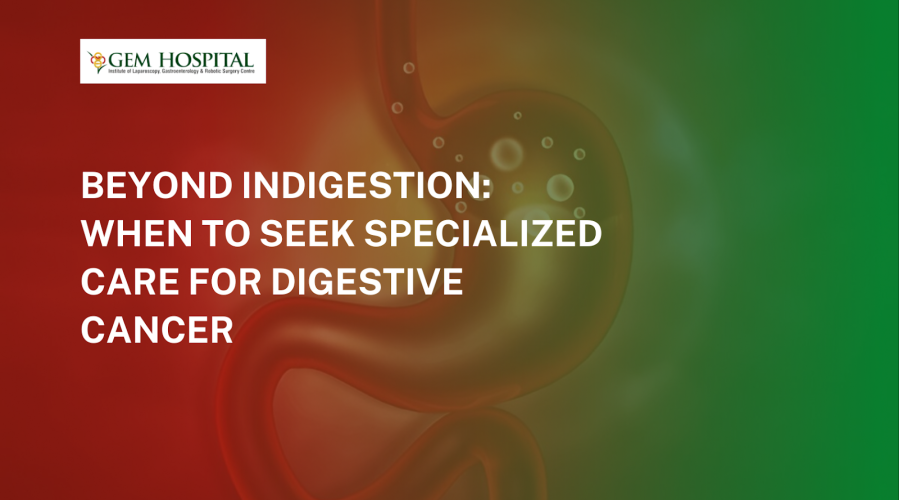Learn what gallstones are, their common symptoms, causes, and treatment options. Discover when to seek medical care and how to manage gallstone complications effectively.
Beyond Indigestion: When to Seek Specialized Care for Digestive Cancer

Digestive distress is probably a common problem - and something everyone dismisses with gas, indigestion, or a bad meal. What if your indigestion is a continual bothersome feeling, not the everyday distress from digestion? In more rare instances the autonomic symptoms of our digestive systems could be our body's first sign of digestive cancer. In the early stages, digestive distress is general in nature and benign or an indication that the distress is not common. It is important to know the distinction between being upset or distressed and being ill or sick. This distinction is what informs the need for digestive cancer care.
Understanding Digestive Cancer
Digestive Cancer is a catch-all term for cancers of our gastrointestinal (GI) tract. The GI tract can include any part of the GI and includes but is not limited to, the esophagus, stomach, liver, pancreas, colon, and rectum. Many digestive cancers are difficult to detect, and the presenting symptoms are similar to benign digestion symptoms and similar to other medical diagnoses. Early detection is essential to successful treatment.
Why Indigestion Shouldn't Always Be Ignored
It’s easy to dismiss indigestion as minor. But when it doesn’t go away or comes with other symptoms it may require immediate medical attention. Watch out for these red flags:
- Persistent or severe indigestion lasting more than two weeks
- Difficulty swallowing or a feeling of food getting stuck
- Unexplained weight loss
- Blood in stool or dark, tarry stools
- Fatigue without a known cause
- Vomiting (especially with traces of blood)
These symptoms may not always mean cancer, but they are significant enough to warrant evaluation by a gastroenterologist or a cancer specialist.
The Importance of Early Screening and Diagnosis
Many digestive cancers develop silently, showing little or no signs until advanced stages. Routine screenings like colonoscopies, endoscopies, or imaging scans can detect abnormalities early, even before symptoms appear.
You may be at higher risk and should consider early screening if you have:
- A family history of GI cancers
- A personal history of polyps or inflammatory bowel disease
- Chronic acid reflux or Barrett's esophagus
- Lifestyle risks like heavy alcohol use, smoking, or poor diet
- Age above 50
Timely intervention from a center specializing in digestive cancer care can make a significant difference in outcomes.
Why Specialized Digestive Cancer Care Matters
Cancer care is not one-size-fits-all especially for the digestive system, which includes multiple complex organs. A specialized digestive cancer care center offers:
- Multidisciplinary Approach: A team of oncologists, gastroenterologists, surgeons, and radiologists who work together on your case
- Advanced Diagnostics: Access to state-of-the-art imaging, endoscopic procedures, and biopsy techniques
- Tailored Treatment Plans: Personalized treatment that includes surgery, chemotherapy, radiation, or targeted therapies
- Support Services: Nutrition guidance, counseling, and post-treatment rehabilitation
Specialized care not only improves treatment accuracy but also enhances the patient’s comfort and long-term recovery.
When Should You See a Specialist?
Don’t wait for symptoms to worsen. Consider visiting a digestive cancer care center if:
- You've had persistent symptoms that don’t improve with over-the-counter medication
- You notice any unusual changes in your digestion or bowel habits
- You're over 45 and have never had a GI screening
- You have a strong family history of digestive cancers
- You’ve been diagnosed with a precancerous condition like polyps or chronic gastritis
Taking proactive steps may not just save time, it can save your life.
How GEM Hospital Stands Out in Digestive Cancer Care
GEM Hospital is a recognized leader in gastrointestinal and digestive cancer care. With over two decades of excellence in minimal access surgery and cancer treatment, GEM offers unmatched diagnostic precision and treatment options for patients with digestive cancers.
Our Specialized Services Include:
- Cutting-edge laparoscopic and robotic surgeries for GI tumors
- Advanced diagnostic tools including endoscopic ultrasound and PET scans
- Integrated oncology and gastroenterology teams
- Nutritional and psychological support throughout the treatment journey
- Personalized follow-up care to reduce recurrence risks
Patients choose GEM Hospital for our clinical expertise but also because we care for the whole person and not just their disease. Patients come to GEM Hospital because we believe, as you do, that your health can’t wait.
Your Health Can’t Wait
Chronic pain, chronic digestive issues can be the body's weak whisper for help. Tired of confusion? If you have experienced long-term digestive issues, digestion issues, gastro-intestinal issues in the past or are part of a high-risk population, it is time to enter a system of early detection for potentially better health outcomes.
Contact GEM Hospital today to book your appointment and let us shorten your decision-making distance to better health.
Your digestive health is important. Let the leaders in digestive cancer care help you.
Blogs & Article
Learn about bloating and gas problems, including common causes, symptoms, and effective solutions to improve digestion, reduce discomfort, and maintain gut health.
Learn how unverified Ayurveda treatments may cause liver damage, understand the risks, symptoms, and why medical guidance is essential for safe care.


